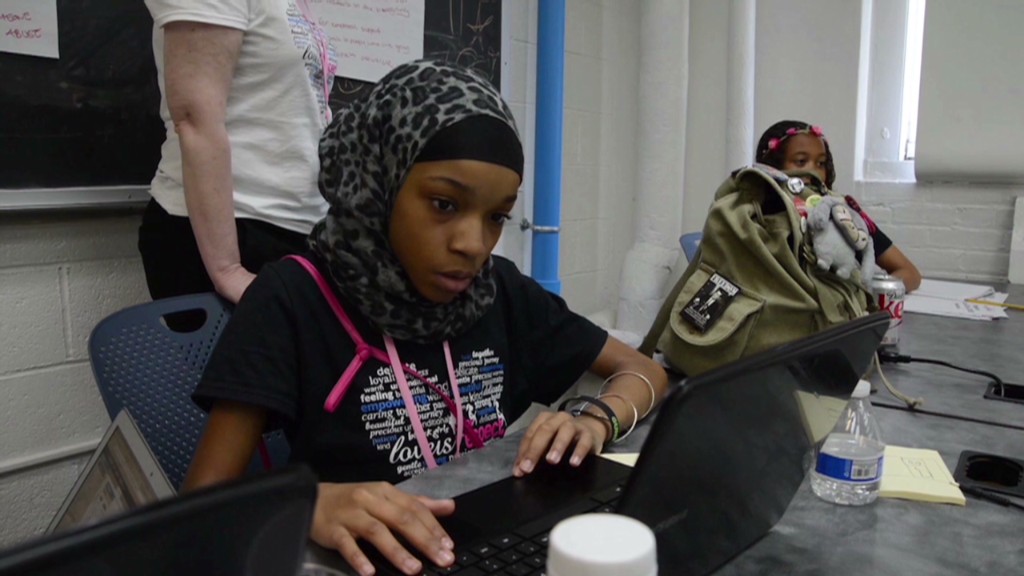
Over 60 participants, 17 teams and two days of marathon computer programing -- and they're all girls of color under the age of 18.
This past weekend, Black Girls CODE, a nonprofit that teaches coding to girls from underserved communities, hosted its first ever hackathon.
"One of the biggest obstacles to black girls getting into tech is lack of exposure," said biotechnologist and engineer Kimberly Bryant, who founded Black Girls CODE in 2011. "We don't see many role models for our girls to emulate. We see mostly white males at the top of the STEM fields."
In fact, black women are only 2% of the United States' science and engineering workforce, while white men comprise 51%, according to the National Science Foundation. Google (GOOG) brought tech's diversity issues into the spotlight last week, when it reported that just 30% of its employees are women and 2% are black.
Related: 'Google Should Hire Me'
Black Girls CODE aims to change that by sponsoring tech events like its hackathon.
Hosted by the New York University Polytechnic Institute in Brooklyn, N.Y., the code fest is part of a series of three Black Girls Code hackathons taking place across the United States. The others will bring young programmers to hackathons in Oakland, Calif. and New Orleans, La.
"It's no secret the there's a diversity problem in tech," said Alexis Ohanian, co-founder of social-networking site Reddit, who served on the judges' panel for the coding competition. "When we get more people who are thinking about themselves as technologists, who are starting to learn this incredibly valuable skill, we're going to benefit from so many other ideas that we never would have gotten before."
Ohanian was also the anchor sponsor of a Crowdtilt campaign that raised over $12,000 for the Brooklyn hackathon.
Related: Black, female, and a Silicon Valley 'trade secret'
So far, Black Girls CODE has served about 3,000 girls, many on scholarship, in six different cities to date.
The theme of this year's hackathon was "Love Is Respect." The girls were tasked with creating mobile apps and websites to educate young people about and provide resources for abuse-free relationships. Black Girls CODE partnered with Verizon (VZ) Wireless HopeLine, sponsor for the three-city event, and Break the Cycle, a youth-led organization working to end domestic violence and abuse.
The subject is particularly relevant to the hackathon participants' age group. Teen girls and young women under the age of 25 experience intimate partner violence at a significantly higher rate than any other age group of women in the country.
Twelve-year-old Solé Stewart from New Jersey, like many of her peers, is a first-time-hackathoner. Her team created a mobile app game called Relationship Guide that quizzes gamers on different aspects of their relationship and determines how healthy the relationship is. Negative results will send you to a resource page for help and advice on improving the situation. "I'm going to make more apps at home," said the aspiring engineer.
The winning team walked away with $1,500 a piece in scholarships and earned a $2,500 Verizon HopeLine grant for a community-based non-profit of their choice. The Brooklyn champs' app will go on to compete with the top apps from the Oakland and New Orleans Black Girls CODE hackathons. The best in show will have their app developed and sold by Verizon, which will donate $3, up to $5,000, for every app sold to an organization working on teen dating violence prevention.
"I like playing with apps, but I never thought I would make my own," said 12-year-old Aniyah Denis from Queens, N.Y.
For Bryant, leveraging tech for social change is what the event is all about. "The focus of the hackathon is rebranding tech to show how it can address real world issues," she said, "showing girls they can make an app that can make a difference."

